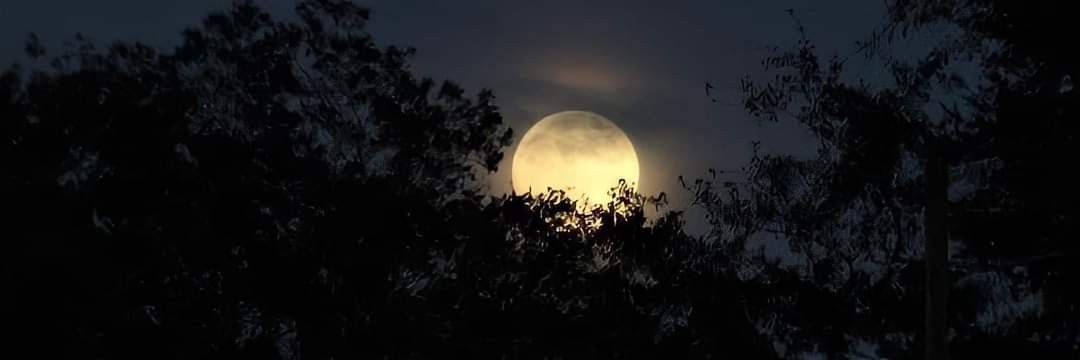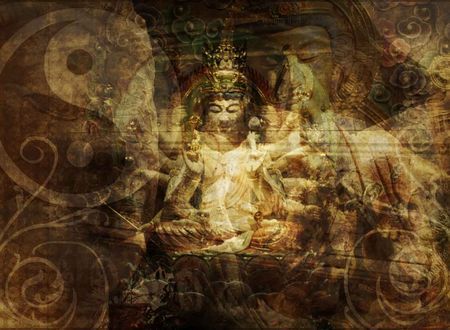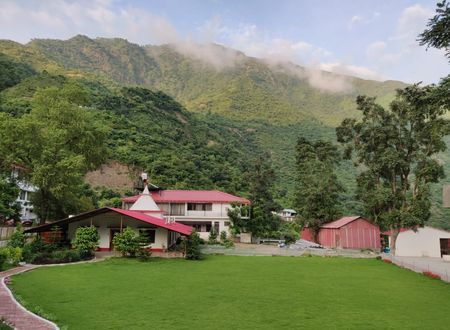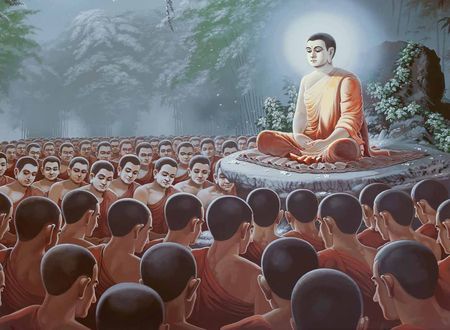The night sky draped around the forest like the brushstrokes of a brooding artist.
A mute landscape, brimming with consolations but devoid of sounds, silence had lent itself to his grief. The birds flew, but they didn’t chirp. The wind blew, but it didn’t whistle. The trees and those that resided within its foliage, the streams and those that quenched their thirst with its water – they had all fallen silent. Sworn to vows of quietude, they moved without music. First, it was the frogs that resolved to renounce their croaking until his sobs subsided. Then it was the rain that promised to pour without the pitter-patter of its arrival. One by one, every resident of the forest had grown quiet, all in the desire that the drowning of their noises would amplify that one sound they hoped would be heard.
Embroiled in a darkness that even the moon shuddered to touch, the wilderness had been reduced to a single, deafening cry. This sound had sprung as a gentle weeping, almost inaudible at first. But with every passing day, it had only grown more mournful, desperate in its pleading to be perceived, steeped in a pain that overpowered every being with a beating heart.
The creatures of the forest had all fallen silent because in his wails, they heard whimpers of their own hearts. That lingering sadness was familiar but had remained forgotten for long. So when they recognised themselves in his weeping, they let his solitary sobs reverberate across the thicket, secretly hoping that he’d be heard, and through him, they would be too.
And so it had all fallen to hush.
But grief can be all-consuming, intoxicating and addictive. Unbearable unhappiness has its own sweetness. If one gets too acquainted with aching, it can start to evoke affinity, slowly solidifying into cuffs of attachments, gripping the wrists of unsuspecting mourners. Something similar had happened to this man who now lay on the forest floor, his back slumped against the trunk of an ancient tree. Head bowed, fingers intertwined and feet bound, he sat slouched to his own self.
He searched his memory, for a time when he was free of the chains that now held him down. All he could find were obscure snapshots of the past that suggested that in some other age, he was happier. Joyful and unfettered.
And now?
The chains clung to him. They were of a special kind. On most days, they were invisible to the eye, but on some days, when the sun shone with a rare intensity, they would glimmer with indignity, ashamed to be brought to the fore by the sun’s presence. And just as the sun moved to kiss the horizon, they would slip back to invisibility. He had merely caught a glimpse, but their sight never left him. Nor did their hold. They wrapped around his body like veins, thin and fine, winding around his flesh, cutting at his existence.
He had done all he could to free himself. The chains had been tugged and bitten, but they stuck solidly to his defeated body. He often found himself repeating words that Kafka would eventually pen a few ages later,” I am in chains. Don’t touch my chains.” He didn’t think anyone else could even begin to fathom what he felt every passing minute of his life. As far as he could see, everybody else scampered about with unbound feet.
“What do the prancing deers know of my bondage? Has the gushing river ever experienced the torment of being tied down? “
In his sorrow, he never noticed the birds that left little berries in his mouth to soothe his hunger. Neither did he thank the fawns that brought green herbs to heal his wounds. He had turned into a motif of grief, lost to the world he claimed to have forsaken.
Yet even in the midst of his misery, he had rare moments of clarity. Moments when he’d notice and observe, moments when he’d step away from himself, even if for a little while. It was during one such rare moment that he noticed a little ladybird crawling up his arm. She was tiny. A little blob of red with small specks of black. The sun was blazing, and in its heat, his chains had glistened to life. He could see them, intricate in their intertwining. He observed how the chains clung to his skin and how the ladybird clung to them. To that little ladybird, the chains weren’t chains. They didn’t hold her down. His bondage was her liberation. The chain that bound him, had become the rope to which the ladybird held on with faith. It was leading her to where she wanted to go.
And where was it that she wanted to go?
His heart.
She moved swiftly, along his arms and towards his chest. She stopped right where the beat of his heart was the loudest. And then, she dug right in. For a brief moment, shock occupied the space he had so long lent to grief. He realised that the web of veins that wrapped his body on the outside, was also present within him. He peered into the little peephole like a cavity that the ladybird had left behind. The longer he gazed at the incision, the bigger it seemed to get. He kept staring until his chest tore apart, right before his eyes. Now, he could look at his heart, the thumping organ with an incessant cry. The ladybird was still crawling and he watched her just as intently. The world melted around him, fading into irrelevance All he could see was that little dot of red that crawled with a sense of sacred reverence. He kept his eyes on her, fearing that he’d lose sight of her.
And soon enough, he did. All dissolved into darkness. “It’s the end,” he mused, “it all ends here.”
But endings look an awful lot like beginnings.
And the light crept in once again.
The ladybird had disappeared, but the rope she had clung to, remained in sight. This time, he noticed that the rope did indeed, look like a rope. It had lost all its resemblance to his shackles. It didn’t wrap around him any longer.
Instead, it gently lay in the grip of a tender hand.
The hand of a mother.
Fingers graced with rings and arms adorned with bangles, she held the length of a rope in one hand, and a stick in another. Her son, her mischievous little prankster stood before her, smiling his innocent smile. Despite the smudges of butter around his lotus pink lips and his dusty hands, streaked with the evidence of his crime, he believed he could fool his mother. So he stood perfectly still, as the wind played with his long pearl earrings and tousled his soft curls, sporting a smile that claimed perfect innocence.
But who in the three worlds can fool her?
Her gaze was locked on her son’s eyes, brilliant and wide as the universe. Her gentle face bore an expression of exasperation, but it couldn’t hide the boundless love that radiated from her presence. She did not know how not to love. Her anger and her threats, it was all but a play. Lila, a playful pretence, nothing more. She knew, it as did her son. Yet they carried on, never letting anyone know.
“Krishna, I’ve had enough of your mischief!”
The golden girdle around his waist gleamed in the afternoon sun, and the little bells tinkled as he sprang to his feet, escaping her. She ran for him, the boy who could only be caught with love.
And if there was someone who could catch him, it was her. For she was that love, the one that embraces and the one that liberates.
She caught him, firmly holding on to his chubby hand. She gave him a soft slap on the cheek. The water from all the oceans rose up to his eyelids, and he was about to break into a flood of tears.
“Oh mother, why must you be so unkind?”
“Oh, Kanha, why must you be so troublesome?”
She wrapped the rope around his belly and around a mortar, “for once you will not roam around, causing trouble.” But the rope fell short by two fingers. She searched for a longer rope, but once again, it wasn’t the right length. This went on for a while until her son broke into a wide smile. Teasing her, he said, “Oh, what is this mother? You’ve caught hold of me, but you fail to tie me down?”
She sighed heavily and then cupped her hands around his cheeks. Planting a kiss on his forehead, she asked him in a whisper, “Oh Kanha, tell me why can’t I tie you down?”
“Maa, you who set everyone free. How could you ever tie me down?”
He took the ends of the rope from her hands, and with one swift motion, created a perfect knot around his own waist. Damodar. He whose belly is tied with a rope and he whose heart can be bound only with a rope of love.
His mother couldn’t help but smile. “Now don’t you dare move, okay?“
He nodded, “Promise.”
And as soon as his mother walked out, he broke his promise.
He moved ahead, dragging the mortar with him. The mortar was so heavy, that it was rarely moved from its original place. But he was a wilful child and no weight could prove to be a burden for him. He dragged it along, out of the house and towards the two mighty Yamala Arjuna trees, who stood close together. His little body inched through the small space between the two tall trees, but the massive mortar couldn’t be pulled out of the aperture. He tugged with all his might, uprooting the roots that a few seconds ago were bound firmly in the soil. All it took was one pull and the sturdy trees came crashing down, like thunderbolts on a stormy night. And akin to flashes of lightning, two luminous forms, the sons of Kubera, rose to the skies. With folded hands and heads bowed in reverence, they thanked the little boy. He had let himself be bound, so he could set them free. He may have broken a promise minutes ago, but he stood true to the promise he’d made aeons ago.
The noise of the crashing trees has alarmed his parents, who now came rushing out. Amidst the wreckage, he sat serenely. His father let out a scream of shock and his mother hurried to pick him up. When she reached him, she fell to her knees and smeared his beautiful dark skin with kisses. Holding him close to her bosom, she wept silently.
“Oh mother, set me free,” he smiled.
—
“Oh mother, set me free,” he repeated. Over and over, again and again. This mantra had become his very breath. For years he’d spent every second steeped in sorrow and now he held onto steadfastly to this prayer which suffused him with joy. Slowly, he began to notice the many wondrous ways in which the creatures of the forest cared for him, His heart which was once heavy with grief, now grew wide with gratitude. A few days later, he spotted the ladybird once again. This time, she crawled down the length of his arm and onto the lush grass of the forest floor. “Wait,” he whispered, but she continued crawling ahead. So he rose to his feet, treading ahead with soft steps. When he began following her, the ladybird stopped and so did he. She had a tiny little face, but he swore he saw her smile. It took him a while to realise what had just conspired.
He was free. He examined his arms and his feet and found no trace of the web that had wrapped around him so long.
Had it all merely been a trick of the light?
Perhaps.
For he’d always been free.
“I seem to have loved you in numberless forms, numberless times…
In life after life, in age after age, forever.
My spellbound heart has made and remade the necklace of songs,
That you take as a gift, wear round your neck in your many forms,
In life after life, in age after age, forever.”
– Unending Love: Rabindranath Tagore
Author’s Note:
I have been meaning to write this post for months. The idea sprung when late into the night, I heard this song for the first time and was instantly reduced to tears. It takes a while for a flash of emotion to brew into a written ode. The process has been a labour of love. Though I may claim to have put pen to paper, (or fingers to the keyboard, to be precise) the words have simply flown in from a place of grace.
It is hopefully, the first of the many offerings yet to come.









Comments & Discussion
16 COMMENTS
Please login to read members' comments and participate in the discussion.